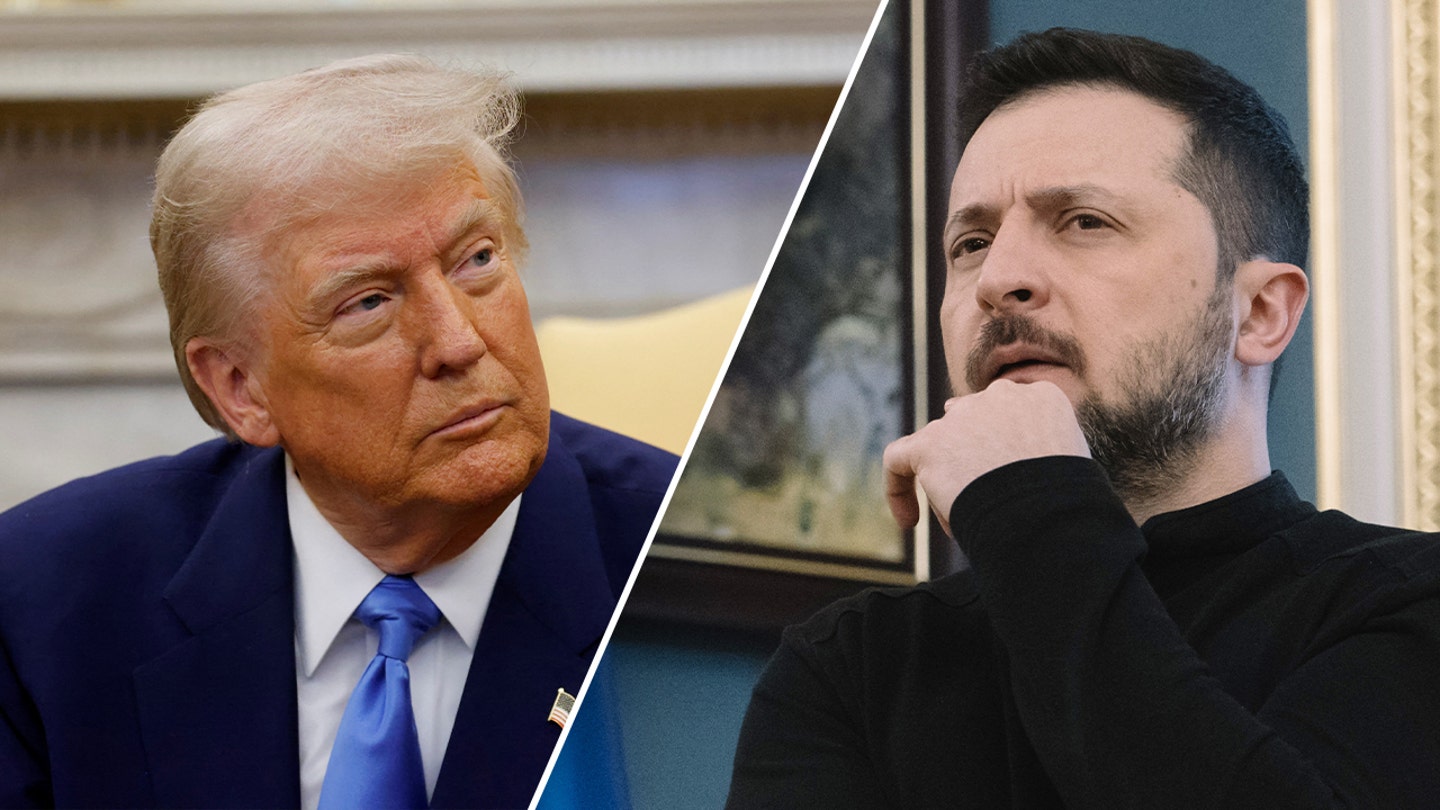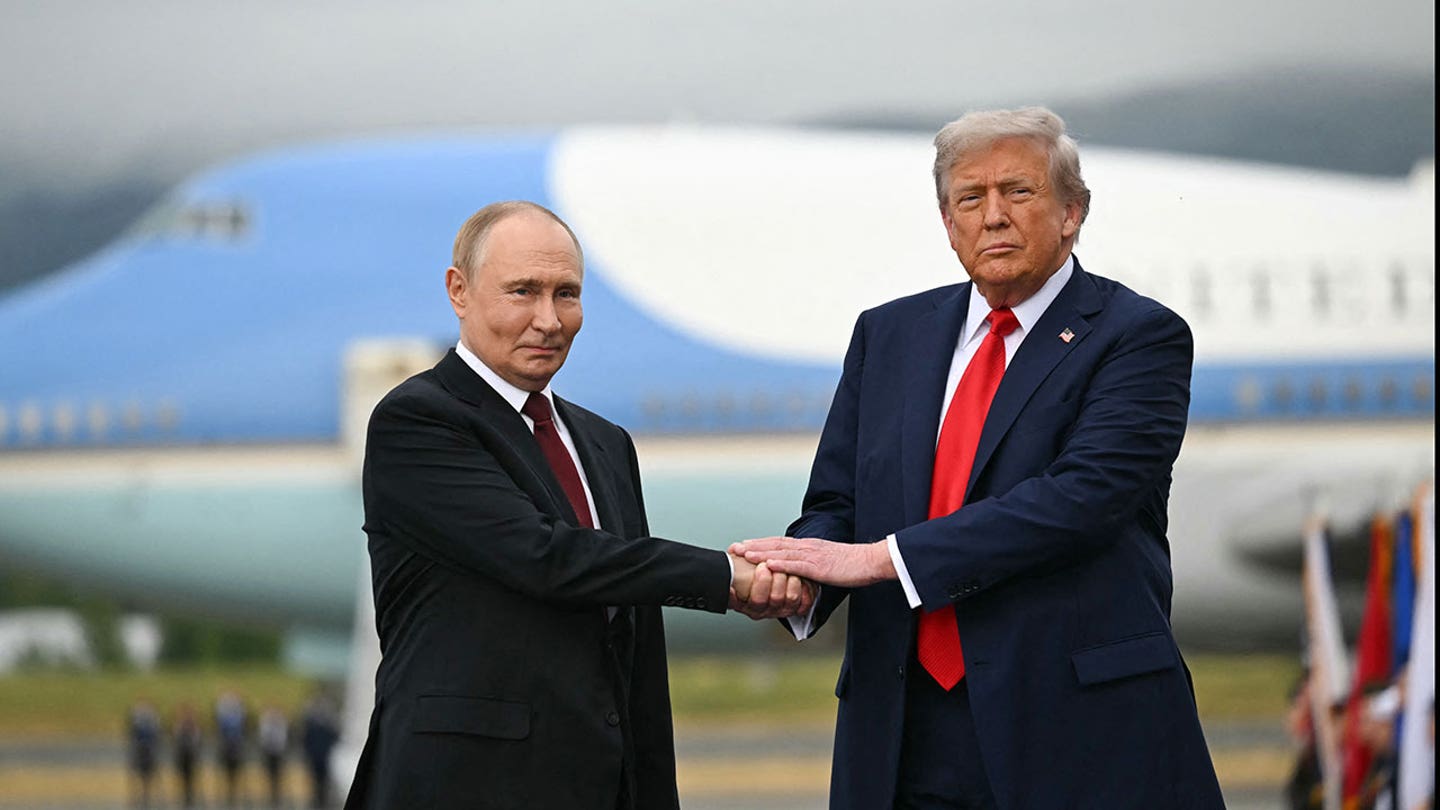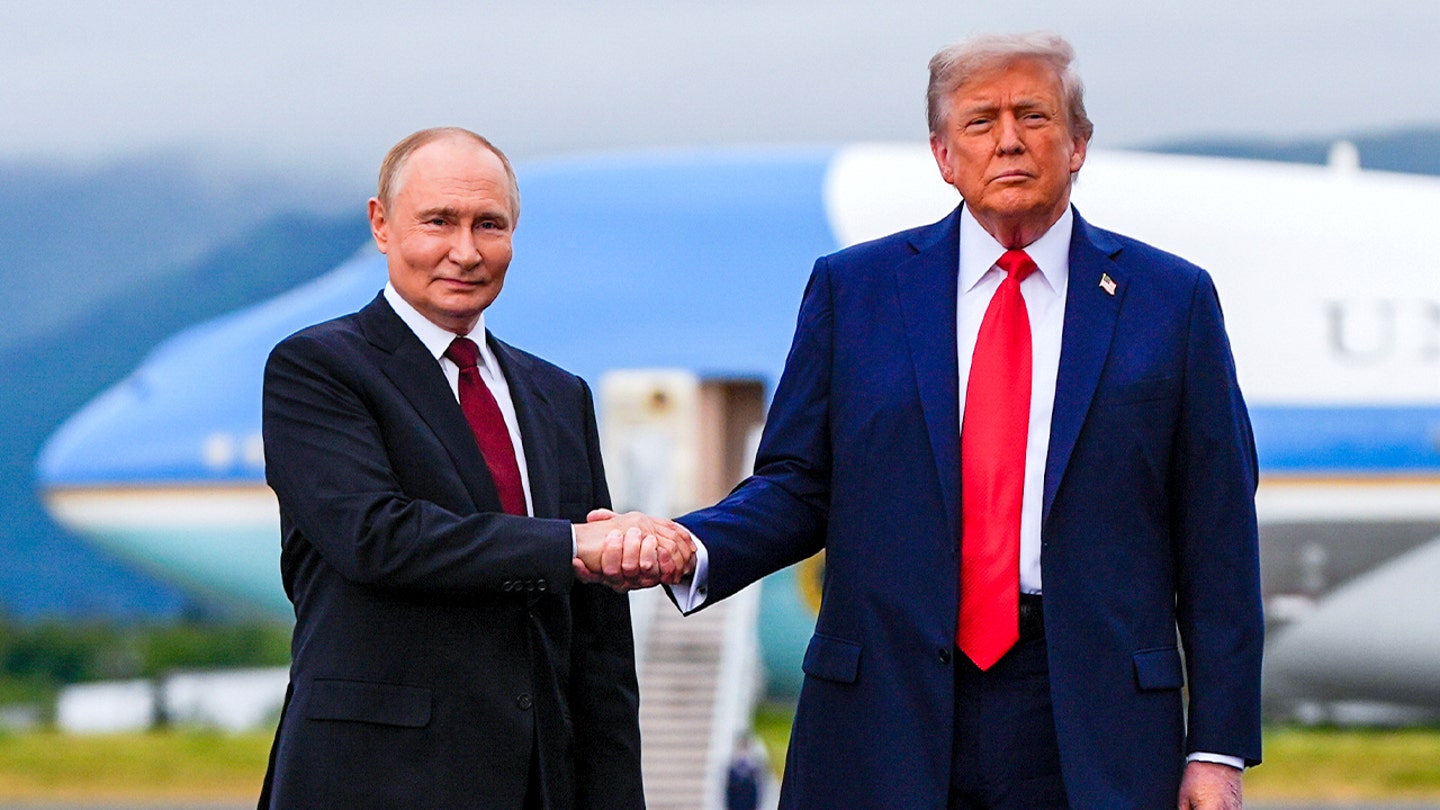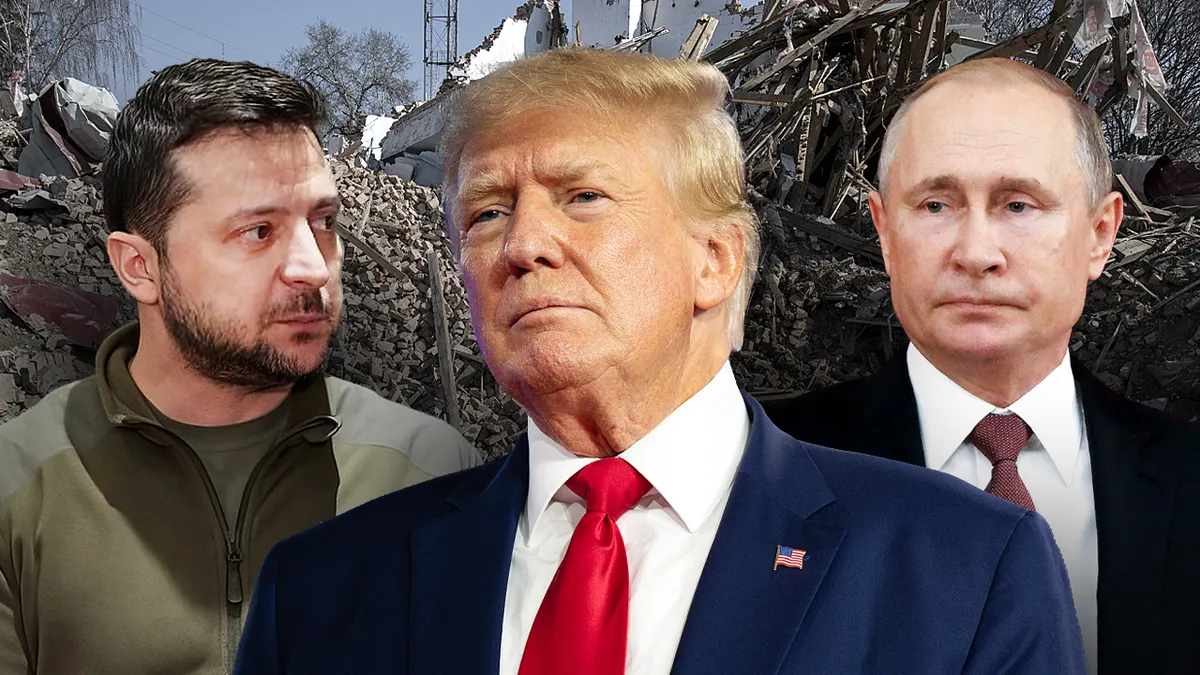
Zelenskyy to meet with Trump in Washington, DC following US-Russia talks
Entities mentioned:
- Volodymyr Zelenskyy: Self-preservation, Duty, Unity
- Donald Trump: Legacy, Influence, Recognition
- Vladimir Putin: Power, Control, Influence
- Mark Rutte: Duty, Unity, Security
Article Assessment:
Credibility Score: 65/100
Bias Rating: 65/100 (Lean Right)
Sentiment Score: 60/100
Authoritarianism Risk: 45/100 (Mixed/Neutral)
Bias Analysis:
The article leans slightly right, primarily due to its reliance on Trump and Fox News as primary sources. While it includes perspectives from multiple parties, there's a noticeable emphasis on Trump's role and statements, potentially overemphasizing his influence in the peace process.
Key metric: Diplomatic Influence
As a social scientist, I analyze that this article highlights a significant shift in diplomatic dynamics surrounding the Russia-Ukraine conflict. Trump's direct involvement in negotiations with both Putin and Zelenskyy suggests a potential change in the U.S. approach to the conflict. The proposed trilateral meeting indicates a move towards more direct diplomacy, bypassing traditional international frameworks. This could impact the U.S.'s diplomatic influence by positioning it as a key mediator in the conflict, potentially altering its relationships with both Ukraine and Russia, as well as with NATO allies. The emphasis on a 'Peace Agreement' over a 'Ceasefire Agreement' suggests a push for a more permanent solution, which could have far-reaching implications for regional stability and U.S. foreign policy objectives in Eastern Europe.

ROBERT MAGINNIS: What comes next for US, Russia and Ukraine after Alaska summit
Entities mentioned:
- Donald Trump: Power, Recognition, Legacy
- Vladimir Putin: Control, Power, Self-preservation
- Volodymyr Zelenskyy: Determination, Justice, Unity
- United States: Influence, Security, Power
- Russia: Control, Power, Self-preservation
- Ukraine: Self-preservation, Freedom, Justice
- NATO: Unity, Security, Influence
- China: Power, Influence, Wariness
Article Assessment:
Credibility Score: 75/100
Bias Rating: 55/100 (Center)
Sentiment Score: 45/100
Authoritarianism Risk: 30/100 (Generally Democratic)
Bias Analysis:
The article presents a balanced view of the summit, offering perspectives from multiple sides. While it leans slightly towards a Western viewpoint, it attempts to provide objective analysis of all parties' motivations and potential outcomes.
Key metric: International Diplomatic Influence
As a social scientist, I analyze that this summit represents a critical juncture in U.S.-Russia relations and the ongoing Ukraine conflict. The meeting, while not producing concrete agreements, establishes a foundation for potential future negotiations. The careful choreography and symbolism of the event underscore its significance in global diplomacy. The article highlights the delicate balance between pursuing peace and maintaining a strong negotiating position, particularly for the U.S. and Ukraine. The emphasis on sanctions as a key leverage point suggests that economic pressure remains a primary tool in international conflict resolution. The involvement of multiple stakeholders, including NATO and European allies, indicates the complex, interconnected nature of this geopolitical situation. The article also points to the broader implications of these negotiations, particularly in terms of global power dynamics and the potential impact on other international actors like China. The analysis provides a nuanced view of the challenges ahead, emphasizing the need for rigorous verification mechanisms and sustained diplomatic efforts.

Zelenskyy outlines peace demands before high-stakes White House meeting with Trump
Entities mentioned:
- Volodymyr Zelenskyy: Justice, Self-preservation, Determination
- Donald Trump: Legacy, Influence, Power
- Vladimir Putin: Power, Control, Influence
- European Leaders: Security, Unity, Influence
Article Assessment:
Credibility Score: 75/100
Bias Rating: 55/100 (Center)
Sentiment Score: 45/100
Authoritarianism Risk: 35/100 (Generally Democratic)
Bias Analysis:
The article presents multiple perspectives, including those of Zelenskyy, Trump, Putin, and European leaders, providing a relatively balanced view. However, there's slightly more emphasis on Trump's role and statements, which could indicate a slight center-right lean.
Key metric: International Relations and Diplomacy
As a social scientist, I analyze that this article highlights the complex diplomatic efforts to end the Russia-Ukraine war. The involvement of key global players like the US, Russia, and European nations demonstrates the international significance of the conflict. Zelenskyy's firm stance on achieving 'real peace' and his wariness of Russian treachery indicate Ukraine's determination to protect its sovereignty. Trump's pivot from seeking a ceasefire to pursuing a peace agreement suggests a shift in US diplomatic strategy. The European leaders' insistence on Ukraine's security guarantees and sovereignty reflects their cautious approach to peace negotiations. This high-stakes diplomacy could significantly impact global power dynamics and the future of international conflict resolution.

Trump closes out 30th week in office with 'very warm' high-stakes Putin meeting
Entities mentioned:
- Donald Trump: Power, Legacy, Influence
- Vladimir Putin: Power, Control, Influence
- Volodymyr Zelenskyy: Self-preservation, Unity, Justice
- Metropolitan Police Department: Duty, Security, Professional pride
- Brian Schwalb: Justice, Duty, Indignation
- Smithsonian: Professional pride, Duty, Integrity
Article Assessment:
Credibility Score: 65/100
Bias Rating: 70/100 (Lean Right)
Sentiment Score: 55/100
Authoritarianism Risk: 75/100 (Authoritarian Tendencies)
Bias Analysis:
The article leans right, favoring Trump's perspective and actions. It presents his decisions and statements largely without critique, while opposition views are given less prominence.
Key metric: International Relations and Conflict Resolution
As a social scientist, I analyze that this article highlights significant shifts in U.S. foreign policy and domestic governance under Trump's second term. The high-stakes meeting with Putin suggests a unilateral approach to resolving the Russia-Ukraine conflict, potentially sidelining traditional diplomatic channels and international bodies. The federal takeover of Washington D.C.'s police force and the review of the Smithsonian indicate a centralization of power and an attempt to reshape national narratives. These actions could have far-reaching implications for U.S. democratic institutions, international relations, and the balance of federal and local powers.

Will Cain weighs in on male cheerleaders and NFL culture
Entities mentioned:
- Will Cain: Influence, Recognition, Professional pride
- Fox News: Influence, Competitive spirit, Control
- NFL: Pride, Influence, Control
- Donald Trump: Power, Recognition, Legacy
- Vladimir Putin: Power, Influence, Control
Article Assessment:
Credibility Score: 55/100
Bias Rating: 75/100 (Lean Right)
Sentiment Score: 50/100
Authoritarianism Risk: 35/100 (Generally Democratic)
Bias Analysis:
The bias rating leans right due to the association with Fox News, known for conservative-leaning coverage. The framing of male cheerleaders as a topic for debate rather than reporting suggests a potentially conservative stance on gender roles in sports.
Key metric: Social Cohesion
As a social scientist, I analyze that this brief segment description touches on two disparate topics - international politics and sports culture - which suggests an attempt to blend serious news with lighter cultural commentary. The juxtaposition of the Trump-Putin summit alongside NFL cheerleading practices indicates a potential effort to maintain viewer engagement through topic variety. The mention of 'male cheerleaders' in the context of NFL culture suggests a focus on changing gender norms in traditionally masculine spaces, which could impact social cohesion by challenging established cultural expectations. However, without more context, it's difficult to determine the depth or direction of the analysis provided in the actual segment.

Victor Davis Hanson shares what's setting Democrats 'on fire'
Entities mentioned:
- Victor Davis Hanson: Influence, Recognition, Righteousness
- Democrats: Moral outrage, Fear, Self-preservation
- Donald Trump: Power, Revenge, Influence
- Zohran Mamdani: Ambition, Recognition, Influence
- Hoover Institution: Influence, Legacy, Professional pride
Article Assessment:
Credibility Score: 55/100
Bias Rating: 75/100 (Lean Right)
Sentiment Score: 35/100
Authoritarianism Risk: 45/100 (Mixed/Neutral)
Bias Analysis:
The article leans right, evident in its framing of Democrats negatively and the positive presentation of critiques against 'woke' ideology. The source, featuring a conservative think tank fellow on a right-leaning show, further indicates a rightward bias.
Key metric: Political Polarization Index
As a social scientist, I analyze that this article likely contributes to increased political polarization. The framing of Democrats as 'melting down' and the focus on conflict between political ideologies suggests a deepening divide. The mention of Trump 'targeting the roots of woke-ness' implies an ongoing culture war, which often exacerbates partisan tensions. This type of rhetoric, especially from influential figures like Hanson, can reinforce existing political divides and potentially increase the Political Polarization Index.

Trump backs Putin's proposal for Russia to take full control of Donbas region in Ukraine
Entities mentioned:
- Vladimir Putin: Power, Control, Influence
- Donald Trump: Influence, Recognition, Legacy
- Volodymyr Zelenskyy: Determination, Duty, Self-preservation
- Friedrich Merz: Duty, Influence, Unity
Article Assessment:
Credibility Score: 65/100
Bias Rating: 55/100 (Center)
Sentiment Score: 35/100
Authoritarianism Risk: 60/100 (Mixed/Neutral)
Bias Analysis:
The article presents multiple viewpoints and cites various sources, including European diplomats and U.S. officials. However, it leans slightly towards emphasizing Trump's actions and their potential impact, which could be seen as centrism with a slight right-leaning tone.
Key metric: International Diplomatic Influence
As a social scientist, I analyze that this article highlights a significant shift in U.S. foreign policy regarding the Russia-Ukraine conflict. Trump's support for Putin's proposal to take control of the Donbas region could drastically alter the course of the war and international relations. This move potentially undermines Ukraine's sovereignty and NATO allies' united front against Russian aggression. The change from supporting a ceasefire to pushing for a peace agreement aligned with Russian interests suggests a major realignment of U.S. policy that could have far-reaching consequences for global geopolitics and the balance of power in Eastern Europe.

Trump: We're going straight to Russia-Ukraine peace deal, 'not a mere ceasefire'
Entities mentioned:
- Donald Trump: Ambition, Legacy, Power
- Vladimir Putin: Power, Security, Control
- Volodymyr Zelenskyy: Justice, Self-preservation, Unity
- Keir Starmer: Duty, Unity, Influence
- Emmanuel Macron: Influence, Unity, Duty
Article Assessment:
Credibility Score: 65/100
Bias Rating: 55/100 (Center)
Sentiment Score: 65/100
Authoritarianism Risk: 35/100 (Generally Democratic)
Bias Analysis:
The article presents multiple perspectives, including those of Trump, Putin, and Zelenskyy, providing a relatively balanced view. However, there's a slight emphasis on Trump's role and optimism about the peace process, which could indicate a subtle center-right lean.
Key metric: International Diplomacy Effectiveness
As a social scientist, I analyze that this article presents a significant shift in the approach to the Russia-Ukraine conflict, with Trump positioning himself as a key mediator aiming for a comprehensive peace deal rather than a ceasefire. This approach could potentially impact international diplomacy effectiveness by bypassing traditional diplomatic channels and leveraging personal relationships between leaders. The involvement of European leaders suggests a coordinated Western approach, but the effectiveness hinges on Putin's willingness to participate in a trilateral meeting and make concessions. The article implies a potential breakthrough, but the long-term sustainability of any agreement remains uncertain given the complex security concerns and historical context of the conflict.

Trump reveals 10 striking takeaways from Putin summit in Hannity interview
Entities mentioned:
- Donald Trump: Power, Recognition, Self-preservation
- Vladimir Putin: Power, Control, Influence
- Sean Hannity: Loyalty, Influence, Professional pride
- Volodymyr Zelenskyy: Unity, Self-preservation, Duty
- Joe Biden: Power, Legacy, Duty
Article Assessment:
Credibility Score: 45/100
Bias Rating: 75/100 (Lean Right)
Sentiment Score: 70/100
Authoritarianism Risk: 55/100 (Mixed/Neutral)
Bias Analysis:
The article leans right, primarily due to its uncritical presentation of Trump's claims and the exclusive use of Trump and Hannity as sources. The framing portrays Trump in an overwhelmingly positive light while implicitly criticizing the current administration.
Key metric: International Relations and Diplomacy
As a social scientist, I analyze that this article presents a significant impact on US international relations and diplomacy. Trump's portrayal of his meeting with Putin as highly successful, coupled with his claims about Russia's newfound respect for America, could influence public perception of US-Russia relations. The emphasis on deal-making and Trump's willingness to participate in trilateral talks suggests a shift towards more direct, personalized diplomacy. However, the inclusion of comments about the 2020 election being rigged introduces domestic political controversy into foreign policy discussions, potentially undermining the credibility of US democratic institutions on the global stage. The article's framing of Trump as a key mediator between Russia and Ukraine, while sidelining current administration efforts, may create confusion about the official US stance on the conflict.

Melania Trump urges Putin to protect children in 'peace letter' delivered at US-Russia summit
Entities mentioned:
- Melania Trump: Righteousness, Influence, Unity
- Vladimir Putin: Power, Control, Influence
- Donald Trump: Ambition, Legacy, Influence
- Volodymyr Zelenskyy: Self-preservation, Unity, Duty
- Joe Biden: Legacy, Influence
Article Assessment:
Credibility Score: 65/100
Bias Rating: 70/100 (Lean Right)
Sentiment Score: 60/100
Authoritarianism Risk: 35/100 (Generally Democratic)
Bias Analysis:
The article leans right, given its exclusive source (Fox News) and positive framing of Trump's diplomatic efforts. It presents the Trump administration's actions in a favorable light while minimizing mention of other diplomatic efforts.
Key metric: International Relations and Diplomacy
As a social scientist, I analyze that this article highlights a significant diplomatic effort by the Trump administration to engage with Russia on the issue of the Ukraine war. The use of a 'peace letter' from Melania Trump to Putin represents an unconventional approach to diplomacy, appealing to humanitarian concerns and shared values of child protection. This strategy attempts to bypass traditional diplomatic channels and leverage personal relationships. The summit's outcomes suggest some progress but no definitive resolution, indicating the complexity of the geopolitical situation. The planned meeting with Zelenskyy demonstrates an attempt at balanced engagement with both sides of the conflict. This approach could potentially impact US-Russia relations and the ongoing situation in Ukraine, but its effectiveness remains uncertain.